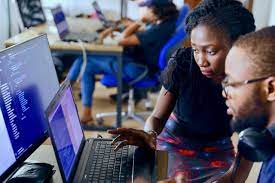150 Nigeria’s Youth Make AfDB’s Coding List Of Digital Ambassadors
A total of 150 Nigerian youths have been selected to participate in the maiden edition of the African Development Bank’s (AfDB) coding for employment programme.
AfDB disclosed this in a statement on Thursday, hinting that 500 changemakers were selected from Nigeria and three other countries for the pilot Digital Ambassadors Program, of whom 45 per cent are women.
Senegalese youths topped the list of the ambassadors with 175, followed by Nigeria, Kenya, 100 and Côte d’Ivoire, 75 in the countries where the coding for employment program is operational.
“The selected Digital Ambassadors will embark on a three-month course during which they will be equipped with in-demand digital skills, such as software development, as well as soft skills, such as problem-solving, project management and communication.
“They will then lead a peer-to-peer training model that seeks to expand digital skills to more African youth, especially in rural communities with limited internet connectivity,” AfDB explained.
The bank and its technical partner, Microsoft, had selected the digital ambassadors from more than 21,000 applications they received from all over Africa.
AfDB’s Director for Human Capital, Youth and Skills Development, Martha Phiri, was quoted as saying, “The Digital Ambassadors Program has come at the right time when the Bank is putting finishing touches to the Skills for Employability and Productivity in Africa Action Plan 2022–2025. The Action Plan will equip African youth with the skills that are in high demand; skills the labour market requires. Both will complement each other and will create a positive impact on Africa’s workforce and lead to economic transformation.”
The digital ambassadors will, after graduation, receive information and communication technology toolkits from the AfDB and Microsoft so they can offer the same training within their local communities, the bank said.
The coding for employment was launched in 2018 to equip African youth with demand-driven information and communication technology skills to position them competitively for the global labour market.
The program has established information and communication technology centres with partner universities across its countries of operation and provided digital skills training to over 150,000 youth, including 135,000 reached through the coding for employment eLearning platform and the digital Nigeria platform, it stated.
The Bank’s Manager for Education and Skills Development, Hendrina Doroba, was also quoted, as saying, “We are delighted by the enthusiasm and the passion the candidates have shown for the program. We have sifted through all the applications to identify candidates whose backgrounds and qualifications closely match the selection criteria. The 500 candidates will not only acquire skills that can help them find work but will also be able to create their jobs while also training others.”



Comments are closed.